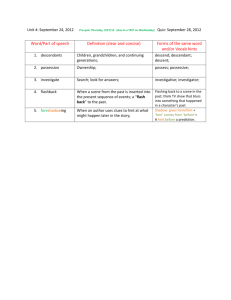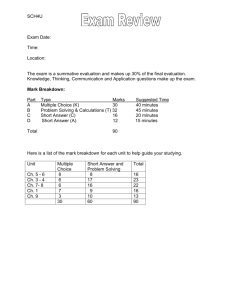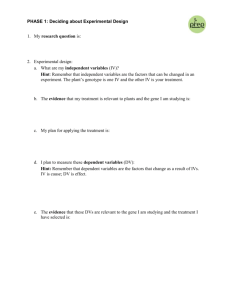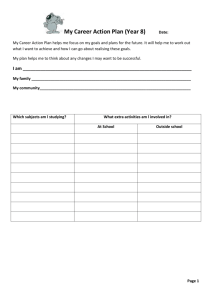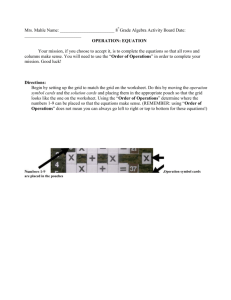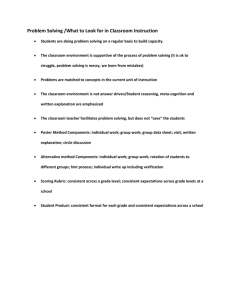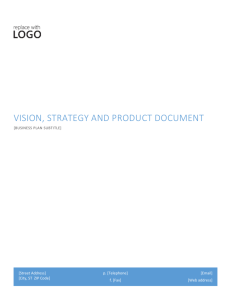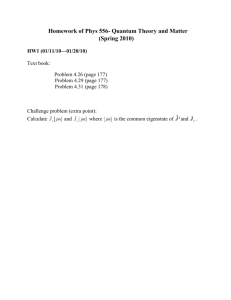Self Cultural Assessment - Trinity Valley Community College
advertisement
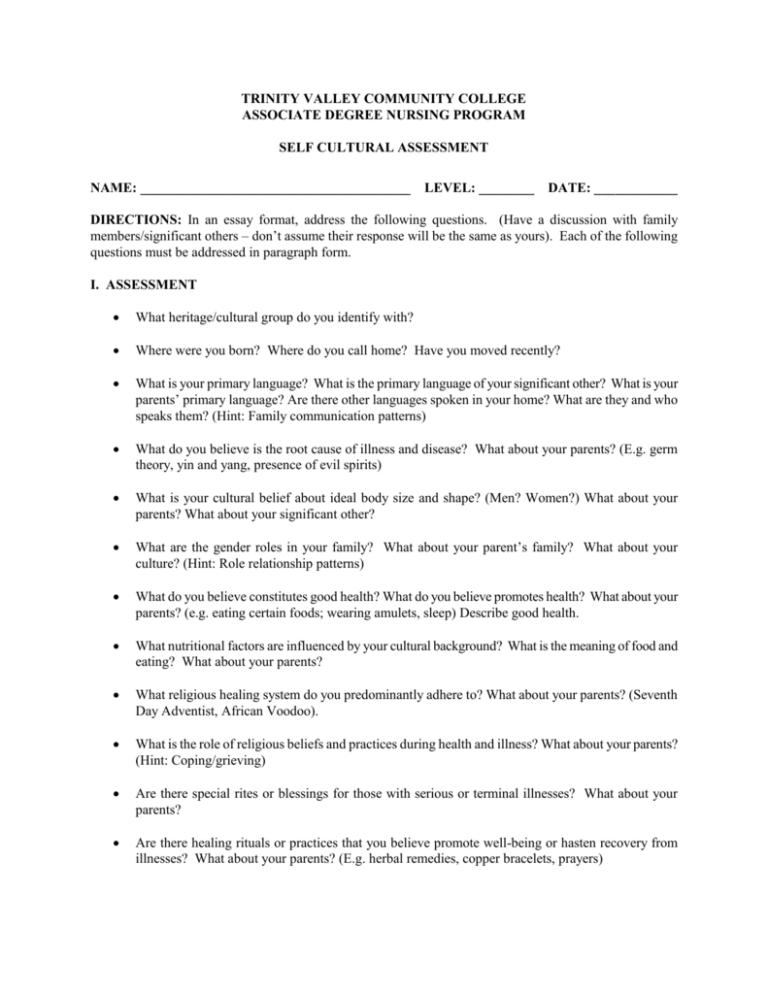
TRINITY VALLEY COMMUNITY COLLEGE ASSOCIATE DEGREE NURSING PROGRAM SELF CULTURAL ASSESSMENT NAME: _______________________________________ LEVEL: ________ DATE: ____________ DIRECTIONS: In an essay format, address the following questions. (Have a discussion with family members/significant others – don’t assume their response will be the same as yours). Each of the following questions must be addressed in paragraph form. I. ASSESSMENT What heritage/cultural group do you identify with? Where were you born? Where do you call home? Have you moved recently? What is your primary language? What is the primary language of your significant other? What is your parents’ primary language? Are there other languages spoken in your home? What are they and who speaks them? (Hint: Family communication patterns) What do you believe is the root cause of illness and disease? What about your parents? (E.g. germ theory, yin and yang, presence of evil spirits) What is your cultural belief about ideal body size and shape? (Men? Women?) What about your parents? What about your significant other? What are the gender roles in your family? What about your parent’s family? What about your culture? (Hint: Role relationship patterns) What do you believe constitutes good health? What do you believe promotes health? What about your parents? (e.g. eating certain foods; wearing amulets, sleep) Describe good health. What nutritional factors are influenced by your cultural background? What is the meaning of food and eating? What about your parents? What religious healing system do you predominantly adhere to? What about your parents? (Seventh Day Adventist, African Voodoo). What is the role of religious beliefs and practices during health and illness? What about your parents? (Hint: Coping/grieving) Are there special rites or blessings for those with serious or terminal illnesses? What about your parents? Are there healing rituals or practices that you believe promote well-being or hasten recovery from illnesses? What about your parents? (E.g. herbal remedies, copper bracelets, prayers) What is the role of significant religious representatives during health and illness? Do you rely on recognized religious/cultural healer? What about your parents? (E.g. curandero, priest, minister) (Hint: Support systems/resources) When do you consider yourself sick? What makes you decide to seek a professional health care provider? What makes you decide when you are no longer sick? What about your parents? What do you do if you get a cold? Sprain you ankle? Get poison ivy? Have an upset stomach? Get constipated? Get diarrhea? Can’t go to sleep? Hurt your back? What about your parents? What is your perception on death? How will your body be treated after your death? What type of funeral will you have? What about your parents? What about your significant other? Does your educational background cause you to feel inferior or superior to health care personnel in the health care setting? What about your parents? What about your significant other? (Hint: Economic resources) How do you view mental disorders? What about your parents? What about your cultural group? (Hint: What coping mechanisms are used by family) Who comprises your social network (e.g. family, friends, peers)? How do they influence your health or illness status? Is there a key family member whose role is significant in health-related decisions? Are there any specific genetic or acquired conditions that are more prevalent in your cultural group? What about your significant others? (Hint: Health promotion needs) What is your perception of aging? What is the role of the elderly in the family? How are the elderly treated in your culture? What do you want to happen when you get too old to care for yourself? What are you going to do with your parents when they are too old to care for themselves? What are your attitudes, values, and beliefs about developmental life events such as birth and death, health, illness, and health care providers? What about your parents? II. ANALYSIS (minimum of two paragraphs each) (Keep in mind this is 40% of grade) Which of your cultural practices promote health and which are detrimental to your health? (Hint: Include health maintenance activities, safety issues, and psychosocial issues) What cultural practices are common or uncommon with the textbook or internet description of your culture? (Must be referenced) III. YOUR GENOGRAM MUST BE ATTACHED ADDRESSING AT LEAST THREE (3)GENERATIONS. N:\Syllabus\coresyllabus\clinical files\Self Cultural Assessment Revised 04//11
